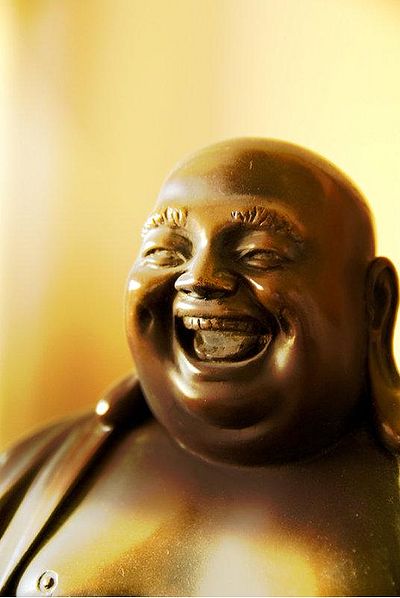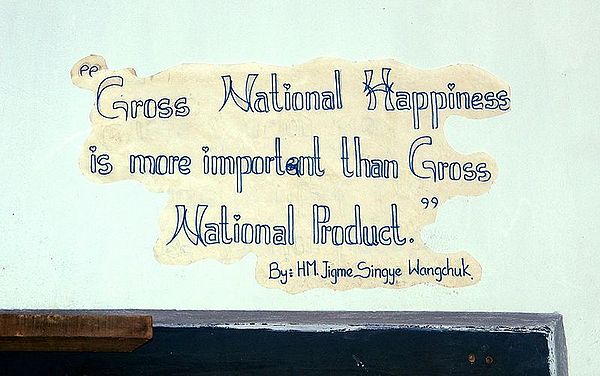Gross National Happiness
The Booty Shaking Breakthrough in Bhutan
It’s happened. Finally the breakthrough in governmental thinking for the future has taken its first step. Commodity driven economics are on tier with humanistic qualities, at least in one part of the world. Nestled in the bosom of the Himalayas, Bhutan has implemented the first policy of Gross National Happiness. Happiness may have many different meanings, but Bhutan has developed criteria that one would be hard pressed to argue against. Traditionally, Gross Domestic Product is the meter of progress used to measure the sum of all goods and services. Gross National Happiness uses this, yes, but only as it relates to the health of the people. In this way, well-being and progress are fused into a sustainable, teamwork oriented process working towards contentment. This concept of Gross National Happiness is crucial in forging a civically intelligent future.
Industry and technology have undoubtedly lifted the antique burdens of survival to those who have access to them, but there are many in the world who are left without these benefits. Along with the ill effects that these processes have had on the environment, humans are faced with novel burdens that require adjustment to the modern modes of existence. A radical revolution of violence and dissemination is not needed. More productive would be an approach that tweaks a few fundamental variables in an established and proven system. We look to sociological evolution rather than revolution. For instance, fully converting to clean renewable energies would offset carbon emissions and prevent further ecological devastation. Providing universal health care would get vital medicinal technologies to the impoverished and needy. The first step in making these changes is with the economics in place. Capitalism has proven fruitful for some, while at the same time disappointing to the point of devastating for most. Again, an overthrow of the system is not needed. Bhutan’s model serves as a perfect example of how a few amendments to GDP will profoundly alter the outcomes of economic policy.
Gross National Happiness
Where did Gross National Happiness begin? The term sprang from the 4th King of Bhutan, His Majesty Jigme Singye Wangchuck’s coronation address as he expressed his desire to preserve the Bhutanese way of life at the dawn of modernization. His declaration that “Gross National Happiness is more important than Gross National Product” was taken seriously. The declaration became a decree and the Centre for Bhutanese Studies, headed by Karma Ura, was recruited to research and develop the concept into a methodical index that can be used for practical application.bliss Today, the index includes nine core principles that guide the formation of indicators and institutions.
- Time use is a measurement that uses both quantitative and qualitative scrutiny to show how well schedules promote success. By administering interviews to households, qualitative data supplies necessary information to make a concrete analysis of what Bhutanese are doing. In this way, qualitative and quantitative data are combined in a synergistic approach to accurately assess a complex topic. Mainly though, activities can be allotted into categories measuring time at work, time with family, time at social functions, time educating and learning, recreating, travelling, volunteering, and even sleeping.1 If it is apparent through the qualitative research that a valued past time is receiving inadequate attention, the institutions respond. Ultimately, a well rounded schedule gives opportunity for the other principles of GNH to have an effect.
- Psychological well-being is one of these principles. It is viewed in three aspects; general distress indicators, emotional balance indicators, and spirituality indicators. Mental illness rates and percentages of drug prescriptions give a clear view of the first two. Since spiritual well-being is so abstract and subjective, the Centre for Bhutan Studies has come up with the questionnaire administered to the population addressing time spent meditating and frequency of positive and negative emotions. Along with a general health survey, an individual’s profile shows whether they’ve met the threshold indicating sufficient psychological well-being.
- The next principle is community vitality. The biological definition of a community is a group of organisms interacting in a shared environment.2 Strong relationships indicate sturdy framework in a community. Bhutan takes measure of this with a survey on family and neighborhood dynamics.1
- Community vitality is tied to another principle; Cultural Diversity and Resilience. Each community has its own culture. The ability to enact the values to younger generations births vivacity. This relies on affluent interaction in neighborhoods. The indicators for this are very specific to Bhutan, looking at the acquisition of traditional dances and folklore.1
- Physical health is undoubtedly a crucial aspect in creating happiness. The number of nerve endings in the intestines matches the amount that is in the brain. More information is actually sent from the body to the brain than from the brain to the body.3 Since the mind is a part of the body, a healthy body creates a healthy mind. Indicators look at the occurrence of illness, knowledge of how disease is spread, and how near to households health facilities are located.1
- Education develops problem solving skills and gives multiple perspectives, which are essential in overcoming obstacles to happiness. Level of education shows how well institutions encourage self motivated learning and personal inquiry. Literacy rates offer insight into the access of knowledge. Other indicators inspect specific languages of Bhutan.
- Ecological diversity and resilience could be the most important value in maintaining a country’s livelihood. In the same way that strong interconnectedness in communities mothers vitality, strong interrelations of the biosphere breeds resilience.5 Countries can avoid famine and drought by nurturing their natural landscapes. Adopting ecological wellness as a value created indicators inquiring into individual sense of environment. Questions address personal reports on pollution and botanical knowledge.1
- Living standard is a good indicator of the opportunities for happiness. Once basic needs such as shelter and food are met, more elaborate means of comfort can be pursued. A household’s income, food ration, and living situation are included in the index questionnaire. 1
- The last index principle is good governance. The survey asks directly how one feels about the government’s performance in creating equitability and deterring corruption. It asks how much trust is placed in the institutions as well as the media. And finally, addresses how well their freedoms of speech and freedom from discrimination are upheld.1
How It Works
The Bhutanese Government administers the survey to the public. Answers given in the survey are numbered. Lowered numbers indicate deficiency and higher numbers mean sufficiency has been met. Within the government body, the GNH Commission receives and analyzes the surveys and makes a formal report on what principles are not being upheld. Government run institutions can then respond immediately. Institutions outside this sphere adhere to government decree, which Parliament creates by passing bills and other measures that are pertinent to the results of the survey. Additionally, proposals for policies must pass through a policy screening derived from GNH principles, developed by Karma Ura. A screening process is in place for projects as well. File:Bhutan see me. jpg


